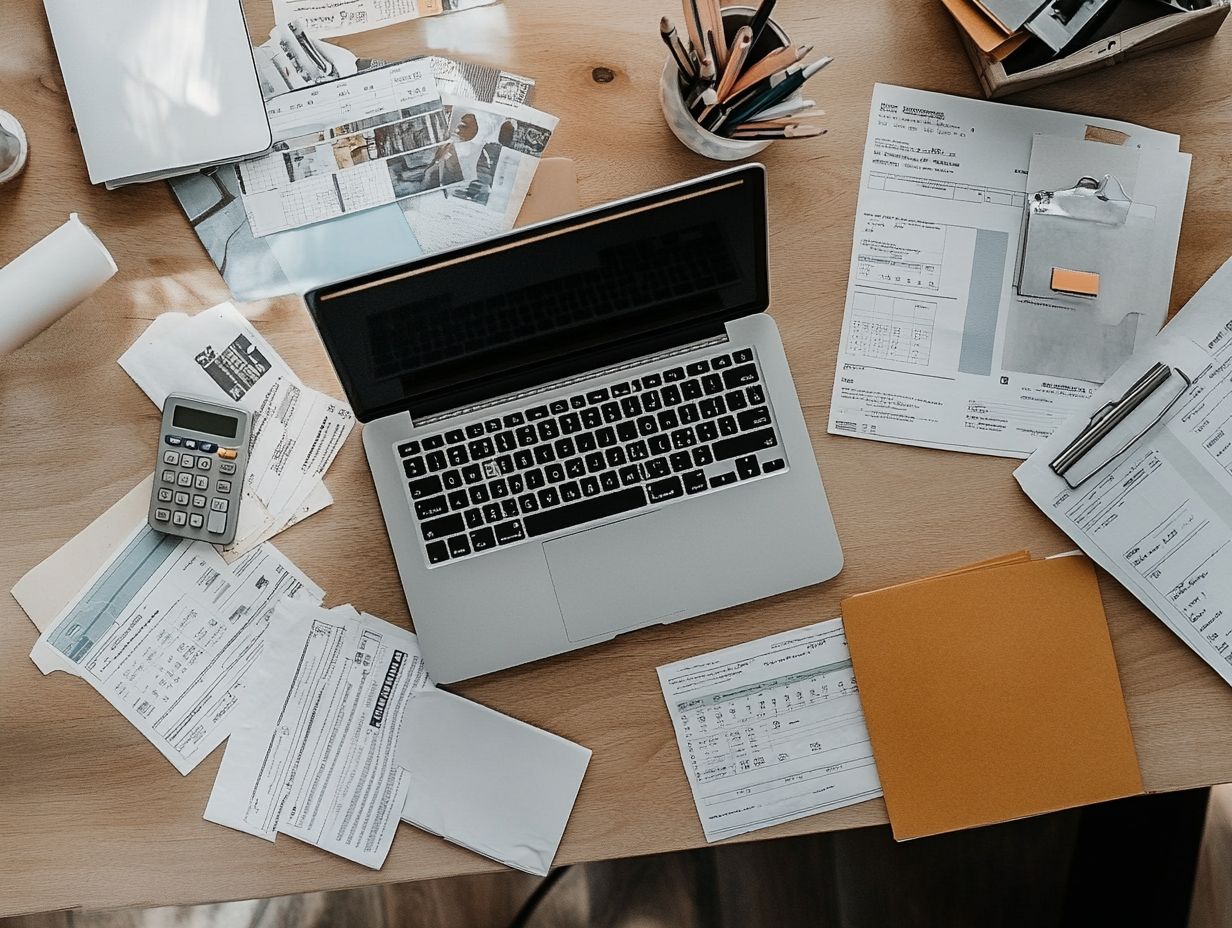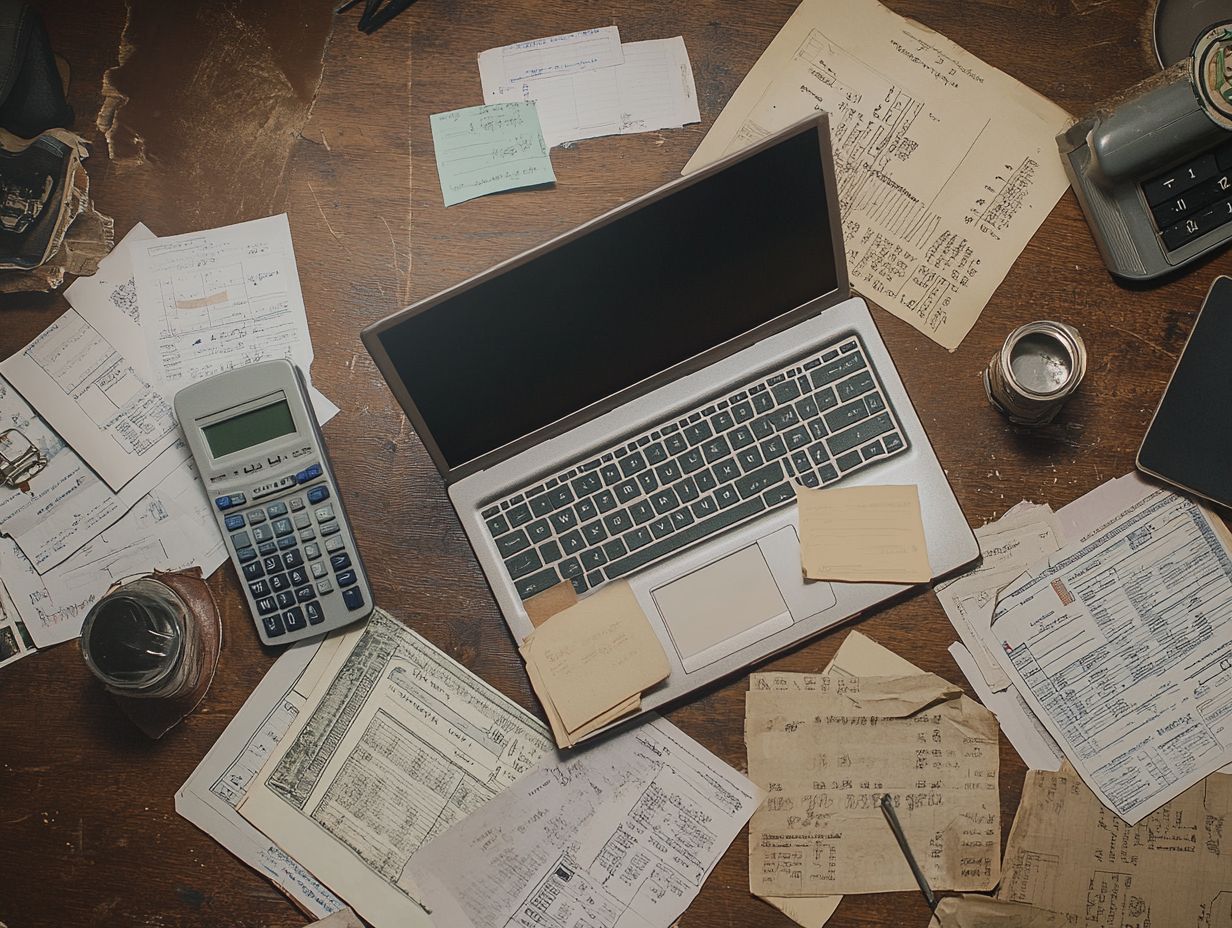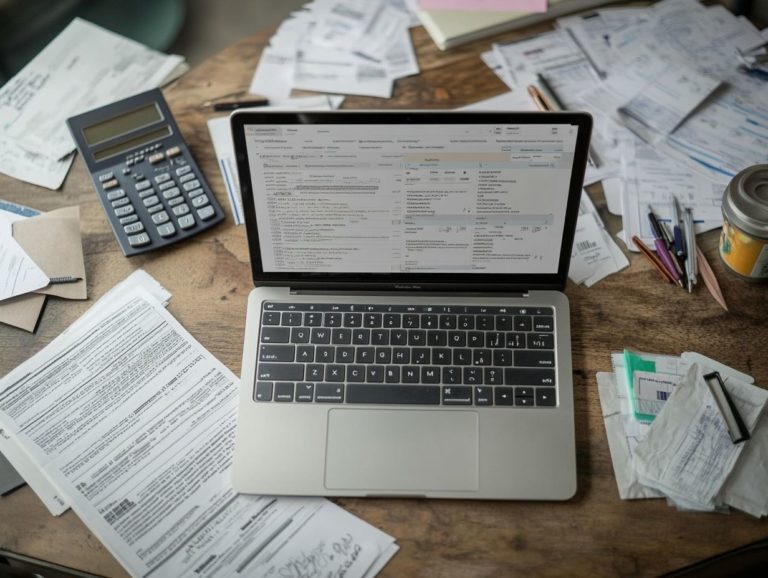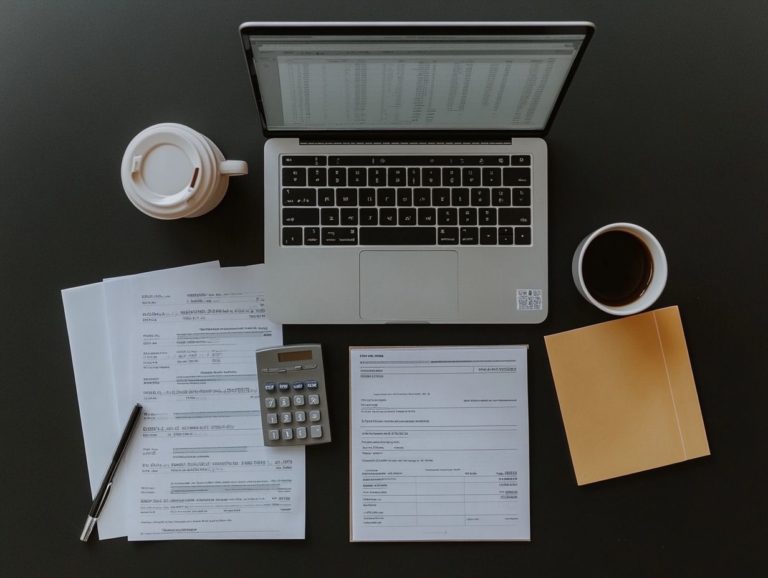Freelancer Tax Deductions You Might Overlook
Navigating the world of taxes as a freelancer can feel both daunting and rewarding. One of the most crucial aspects for you is understanding tax deductions those special allowances that can significantly lighten your tax burden.
This article will clarify what tax deductions are and why they hold particular importance for freelancers like you. You’ll discover commonly overlooked deductions, ranging from home office expenses to health insurance premiums, along with expert tips to help you maximize your savings.
Moreover, we’ll delve into the potential pitfalls of missing out on these vital deductions, including limits on deductions and the risks of an IRS audit. Get ready to discover savings that can change your financial future!
Contents
- Key Takeaways:
- Understanding Tax Deductions for Freelancers
- Commonly Overlooked Tax Deductions for Freelancers
- Maximizing Your Tax Deductions
- Potential Consequences of Not Claiming Tax Deductions
- Frequently Asked Questions
- What are some common freelancer tax deductions that I might overlook?
- Can I deduct my home office expenses as a freelancer?
- Are there any tax deductions for business-related travel as a freelancer?
- What types of professional services or software can I deduct as a freelancer?
- Can I deduct education or training expenses as a freelancer?
- What should I do if I think I may have overlooked some freelancer tax deductions?
Key Takeaways:

Understanding Tax Deductions for Freelancers
Understanding tax deductions is essential for freelancers, particularly those who are working for yourself, as it can notably lower your the amount you owe in taxes and enhance your savings.
Tax deductions cover a range of business expenses you incur. This enables you to manage your money you need to pay more effectively.
These deductions can include expenses related to your home office, professional development, and health insurance premiums. The IRS outlines clear guidelines on what qualifies as a tax write-off. A tax write-off is an expense you can deduct from your income to lower your tax bill, including provisions for Social Security and Medicare Part B. This enables you to capitalize on available tax credits to ease your financial burdens.
Having a solid grasp of these elements is vital for thriving in working for yourself.
What are Tax Deductions?
Tax deductions are specific expenses you can subtract from your total taxable income, effectively trimming down your overall tax bill and maximizing your savings.
For many freelancers, mastering the art of tax deductions can profoundly influence their financial health. The IRS recognizes these deductions, which can encompass a variety of business expenses such as office supplies, home office setups, travel costs, and even educational resources aimed at enhancing your skill set. To navigate this effectively, consider referencing Maximizing Deductions: A Freelancer’s Guide.
Taking into account vehicle use for work-related trips can also improve your tax strategy. For example, if you invest in software that is crucial for your work, such as TurboTax or TaxSlayer, you can write off that expense, thereby reducing your taxable income. Additionally, consider these 5 tips for freelancers on tax write-offs to maximize your deductions.
By maintaining meticulous records and keeping all your receipts, you can ensure that you fully capitalize on every eligible write-off. This ultimately leads to a more robust bottom line when tax season rolls around.
Why are They Important for Freelancers?
For freelancers, understanding tax deductions is crucial; they can significantly reduce your tax liability and play a vital role in maintaining your financial health as a self-employed individual.
Knowing which expenses qualify for tax deductions can be incredibly valuable. It eases the weight of your tax burden while enhancing your cash flow. By leveraging a range of self-employment deductions such as those for home office expenses, software subscriptions, and travel costs, you can retain more of your hard-earned income. For more insights, check out 5 ways to lower your tax liability as a freelancer.
Tax credits can amplify these savings, enabling you to reinvest in your business or strengthen your savings. This strategic approach not only alleviates financial stress but also fosters sustainable growth in a competitive landscape, allowing you to concentrate on your craft instead of fretting over tax season.
Don’t miss out on these savings! Understanding tax deductions is essential for your financial success as a freelancer. Make sure to take full advantage of 5 tax credits freelancers shouldn’t miss and every opportunity available to you.
Commonly Overlooked Tax Deductions for Freelancers
Freelancers frequently miss out on lucrative tax deductions that can significantly enhance their financial standing and lower their overall tax burden. This is particularly true for deductions associated with retirement plans and health insurance.
Consider expenses tied to your home office, travel, professional development, and health insurance premiums. These can all play a crucial role in maximizing your savings and optimizing your tax strategy, especially when you apply 5 essential tax tips for creative freelancers.
Home Office Expenses

Home office expenses can be a valuable tax write-off for freelancers. You can write off costs related to your workspace as long as you meet the IRS criteria for actual expenses or simplified methods.
Understanding what expenses you can claim is essential for maximizing your deductions. Eligible costs often include a portion of your utility bills, internet fees, and even depreciation on the space you use for work. To calculate these expenses, determine the percentage of your home dedicated to business activities; this can be based on square footage or the number of rooms you utilize. Familiarizing yourself with freelancer tax deductions can further enhance your savings.
Remember, the IRS provides specific guidelines on how to claim these tax deductions. By meticulously documenting all related expenses and following IRS regulations, you can capitalize on tax deductions tied to your home office and business expenses.
Travel Expenses
Travel expenses, including the mileage rate for your business-related journeys, represent significant tax deductions that can lower your tax liability as a freelancer.
These expenses encompass costs associated with work travel, such as airfare, lodging, meals, and transportation. To document these expenses correctly, keep your receipts, jot down the purpose of each trip, and maintain a detailed log of your mileage. For freelancers, especially first-time filers, understanding the nuances of these deductions is essential, so be sure to check out freelancer tax tips for first-time filers. Understanding the difference between your actual expenses and the standard mileage rate is vital, as the latter offers a more straightforward method for tax preparation.
Stay organized and informed to maximize your deductions while remaining compliant with tax regulations.
Professional Development Costs
As a freelancer, you can claim professional development costs as tax write-offs. These include expenses for online courses and key certifications, allowing you to invest in your skills while benefiting at tax time.
These expenses can cover activities that enhance your expertise, such as attending workshops and enrolling in online courses. By participating in conferences relevant to your field, you not only acquire valuable knowledge but also have the chance to network with industry professionals, opening doors to new opportunities.
Such investments aren’t just good for your personal growth; they also bolster your business capabilities. Keep good records of these expenses, as they can significantly reduce your taxable income, leading to financial savings when tax season rolls around.
Health Insurance Premiums
Health insurance premiums can serve as a substantial tax deduction for freelancers. You can write off expenses related to your health coverage, easing your financial burden.
This deduction is crucial when dealing with fluctuating income and unpredictable expenses. By deducting these premiums from your taxable income, you can create a more manageable budget and alleviate the financial stress that often comes with healthcare costs.
To qualify for these deductions, ensure you meet specific criteria. This includes not being eligible for employer-sponsored health plans and confirming your health insurance policies, which can impact your tax liability.
Taking advantage of this opportunity can lead to significant savings, particularly through tax credits and contributions to retirement plans. For more insights, explore freelancer tax strategies for increased savings. Start tracking your expenses today to enhance your overall financial health as a self-employed individual!
Maximizing Your Tax Deductions
Maximizing tax deductions is crucial for freelancers striving to enhance their financial position. By implementing effective strategies, you can unlock significant savings and reduce your overall tax liability.
Tips for Keeping Track of Expenses

Keeping accurate records of your expenses is essential for maximizing tax deductions and simplifying your tax preparation process.
By implementing effective expense tracking methods, you gain valuable insight into your finances. This makes it easier to spot trends and cut back on unnecessary spending.
Using software tools like expense management apps offers a streamlined approach to documentation, enabling real-time tracking and categorization of your expenditures.
Establishing a consistent routine for recording expenses not only helps with accurate reporting but also saves you significant time when tax season rolls around. By prioritizing thorough documentation, you ll gain clarity in your finances, paving the way for better budgeting and knowledge-based decision making in the future.
Working with a Tax Professional
Collaborating with a tax professional, like a Certified Public Accountant (CPA), can significantly enhance your ability to navigate tax preparation and get the most out of your tax deductions.
By leveraging their expertise, you can ensure compliance with ever-changing tax laws and avoid costly mistakes that often stem from misunderstanding complex regulations.
A qualified tax professional provides tailored guidance on estimated tax payments, helping you manage your finances more effectively.
Look for a professional experienced in freelance taxation, who understands various business structures and communicates clearly. They can assist you with strategies for retirement contributions and record-keeping, including tax planning tips for new freelancers, ultimately enabling you to concentrate more on your creative endeavors and less on tax-related stress.
Potential Consequences of Not Claiming Tax Deductions
Neglecting to claim tax deductions can have substantial financial repercussions for freelancers. This oversight may result in heightened tax liability and lost savings opportunities, which could have alleviated some of their financial burdens.
Missed Savings and Increased Tax Liability
Missed savings opportunities from unclaimed tax deductions can lead freelancers to face higher tax liabilities, ultimately impacting their overall financial well-being.
For example, many freelancers overlook deductions related to home office expenses, a missed chance to significantly reduce taxable income. If you’re using a portion of your home exclusively for work, you can claim a percentage of your utilities, rent, and even internet costs. To avoid common pitfalls, check out the top tax mistakes freelancers make and how to avoid them.
Self-employed individuals frequently miss out on deductions for business-related travel, meals, and entertainment. Proper documentation of these expenses is critical to avoid leaving significant amounts unreclaimed, which results in unnecessary tax burdens.
It s crucial to keep detailed records year-round and talk to tax professionals. Don t miss out on possible savings!
Frequently Asked Questions
What are some common freelancer tax deductions that I might overlook?

Some common freelancer tax deductions that you might overlook include home office expenses, business-related travel expenses, and subscriptions to professional services or software.
Can I deduct my home office expenses as a freelancer?
Yes, as long as you use a designated area of your home exclusively for work, you can deduct a portion of your rent or mortgage, utilities, and other related expenses as home office expenses. Make sure to keep detailed records and consult with a tax professional for guidance.
Don’t let missed deductions weigh you down start tracking today!
Ready to maximize your deductions? Start organizing your records today!
Yes, you can deduct expenses for business-related travel, such as airfare, hotel stays, and meals. Ensure the trip’s main purpose is business, and keep detailed records of your expenses.
What types of professional services or software can I deduct as a freelancer?
You can deduct subscriptions to services or software needed for your freelance work. This includes accounting software, project management tools, and graphic design programs.
Remember to keep your receipts and records for these expenses.
Can I deduct education or training expenses as a freelancer?
Yes, you can deduct education or training expenses that help your freelance work. This includes courses, workshops, and conferences related to your field.
Keep your receipts and records for tax purposes.
What should I do if I think I may have overlooked some freelancer tax deductions?
If you think you may have missed some tax deductions, consult a tax professional. They can help review your expenses and ensure you re taking advantage of all available deductions to lower your tax bill.






